
News |
- Australia Pledges Protection of Great Barrier Reef
- Green Budget Coalition: Budget 2013
- Paris, City of Light, Goes Dim at Night
- Environment Watchdog Resigns, Goes to Work for IISD
- EU Countries Plan Robin Hood Tax
- Ban Peat Mining in Manitoba: Wilderness Committee
- CEC Responds to Bipole III Motion
- Lake Winnipeg - Most Threatened Lake of 2013?
- First Nations Challenge Omnibus Budget Bills
- Bipole III Coalition Files Motion
- EPA Bows to Oil Company Pressure
- Premier and Governors Urge Obama to Approve Keystone XL Pipeline
| Australia Pledges Protection of Great Barrier Reef | 1 February 13 |
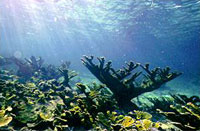
United Nations Educational Scientific Cultural Organization warned last June that the World Heritage Site could be listed as "in danger" if there was no evidence of progress by February 1 on protecting the reef. Threats that include climate change and the predatory crown-of-thorns starfish, which are wearing away the world's largest living structure. The Great Barrier Reef is an iconic Australian environmental asset, the government is absolutely committed to the protection of the reef and our oceans, said federal environment minister Tony Burke as he released the country's report to UNESCO. "We will not cut corners or give an inch on protecting it." View UNESCO World Heritage Centre websiteView February 1, 2013 International Business Times article View February 1, 2013 The Guardian article View January 31, 2013 Reuters article View January 31, 2013 Agence France Presse article |
|
 Print version Print version |
Top |
| Green Budget Coalition: Budget 2013 | 1 February 13 |

The GBC released its recommendations for the 2013 federal budget November 21, 2012. The GBC 2013 recommendations include:
"It's more important than ever to add your voice. Time to tell the government you want your tax dollars to support programs that protect nature," writes the David Suzuki Foundation. View January 24, 2012 David Suzuki Foundation blog postView November 21, 2012 Green Budget Coalition, Recommendations for Budget 2013 View Green Budget Coalition website Sources:
Green Budget Coalition, David Suzuki Foundation
|
|
 Print version Print version |
Top |
| Paris, City of Light, Goes Dim at Night | 1 February 13 |

It is estimated France's new lighting regulations will save enough energy to power 750,000 households, while also reducing France's greenhouse gas emissions by 250,000 tonnes a year, delivering annual savings nearing $1 billion Canadian. Exceptions will be made for Christmas lighting and other local events, and landmarks such as the Eiffel Tower or the Notre Dame Cathedral. It is hoped the rule will also reduce impacts artificial lighting can have on ecosystems, and the sleep patterns of local residents. Former President Nicholas Sarkozy as part of his plan to boost energy efficiency first floated the proposal for darker skies at night in France. The government of current French President François Hollande, who defeated Sarkozy in the May 2012 French presidential election, is now implementing the proposal. View January 31, 2013 Digital Journal coverageView January 31, 2013 Economy Watch coverage View January 30, 2013 French Ministry of Ecology, Sustainable Development and Energy press release View January 30, 2013 Reuters coverage View January 30, 2013 Guardian coverage View January 30, 2013 Business Green coverage Sources:
Reuters, Digital Journal, Business Green
|
|
 Print version Print version |
Top |
| Environment Watchdog Resigns, Goes to Work for IISD | 25 January 13 |

According to a new Conference Board of Canada report, Canada is an "environmental laggard" ranking 15 out of 17 developed nations on environmental performance. The Conference Board report showed Canada: produces more garbage per person than any other nation, uses roughly twice as much water per person as the other nations, places dead last on energy intensity, and ranks 15th on per capita greenhouse gas emissions. Vaughan tabled a number of audits and studies to Canada's Parliament over the past five years, on topics such as climate change adaptation and mitigation, the cumulative impacts of oil sands development, inspections of oil and gas pipelines, freshwater management and sustainable development strategies of the federal government. "I'm not political. I'm colour-blind when it comes to who I'm talking to with different Parliamentarians. I think it is important that our work is presented in a factual way," said Vaughan. Vaughan has accepted a new position as president and CEO at a Manitoba-based think tank, the International Institute for Sustainable Development (IISD). "The institute is thrilled to welcome Scott Vaughan as its new leader. He brings a world of experience and a unique Canadian perspective to the role," said interim IISD Chairman Dan Gagnier. View January 18, 2013 Canada.comView January 17, 2013 Conference Board of Canada press release View January 17, 2013 Huffington Post coverage View January 16, 2013 International Institute for Sustainable Development (IISD) Sources:
Canada.com, Conference Board of Canada, IISD
|
|
 Print version Print version |
Top |
| EU Countries Plan Robin Hood Tax | 25 January 13 |

The goal of the tax, according to a statement issued by the European Council, is "for the financial industry to make a fair contribution to tax revenues, whilst also creating a disincentive for transactions that do not enhance the efficiency of financial markets." Oxfam is asking for a quarter of the sum be allocated to the Green Climate Fund (GCF), to help fund low-emission and climate-resilient development, particularly in poor, more vulnerable nations. However, there is no agreement yet on how revenues will be allocated. An estimated £37 billon will be added to EU coffers annually from this new tax policy. View January 23, 2013 Common Dreams articleView January 22, 2013 The New York Times article View January 22, 2013 Business Insider article View January 22, 2013 The Guardian article View January 22, 2013 Responding to Climate Change article View January 25, 2013 Yes! Magazine article |
|
 Print version Print version |
Top |
| Ban Peat Mining in Manitoba: Wilderness Committee | 25 January 13 |

Three peat mining companies were granted licenses to thousands of hectares of Manitoba's boreal forest peat lands days after a provincial ban on peat mining leases took effect in summer of 2011, despite objections from the government's own experts. The Save Lake Winnipeg Act became law on June 16, 2011, and prevents the province's Mine's Branch from issuing new leases for peat lands. Three peat mining companies; Sun Gro, Jiffy, and Berger, received environmental licences to mine peat in eastern Manitoba, on June 29, July 18 and July 20, respectively. All three environment licences were grandfathered, meaning they were granted based on leases from before the moratorium was imposed. Peat mining negatively affects water quality by releasing sediment into streams and creeks feeding Lake Winnipeg. The mining of peat also releases a tremendous storehouse of carbon, which contributes to devastating climate change. "People are concerned about our water and our climate," said Eric Reder, Campaign Director for the Wilderness Committee. "Manitobans see a solution to these looming environmental disasters, and banning peat mining is part of it." View Wilderness Committee Peat Mining in Manitoba pageView January 9, 2013 Wilderness Committee article View January 9, 2013 Winnipeg Free Press article View January 9, 2013 Winnipeg Sun article View Manitoba Wildlands Peat Mining in Manitoba page View February 2, 2012 CBC News article |
|
 Print version Print version |
Top |
| CEC Responds to Bipole III Motion | 25 January 13 |

The motion requested that participants be allowed to cross-examine Manitoba Hydro witnesses and bring evidence forward relating to Bipole III Route changes and construction methods, possible use of underground cable in agricultural areas, and alternative options to Bipole III terminating at the Riel Converter Station as proposed by Manitoba Hydro. On January 18, 2013 the CEC issued a decision indicating that:
Hearings are currently recessed due to the new route changes and are scheduled to resume March 4, 2013 in Winnipeg, when the CEC will review the supplemental EIS on route changes that Manitoba Hydro has indicated it will file January 28, 2012. Closing statements from Participants, and outstanding presentations are also part of the March hearings. View January 18, 2013 CEC letter to Bipole III Coalition and other participantsView January 18, 2012 Manitoba Wildlands coverage View January 11, 2013 Bipole III Coalition Notice of Motion View January 11, 2013 Bipole III Coalition Motion Arguments View Bipole III Coalition website View Manitoba Wildlands Manitoba Hydro Projects: Bipole III CEC Hearings webpage Source:
Manitoba Clean Environment Commission
|
|
 Print version Print version |
Top |
| Lake Winnipeg - Most Threatened Lake of 2013? | 25 January 13 |
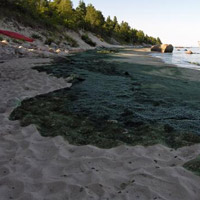
Source: Living Lakes Canada
"As one of the largest lakes in the world, Lake Winnipeg is very well known, but not much is known internationally about the dramatic environmental problems of the lake and the wetlands in its watershed," said Udo Gattenlöhner, of Global Nature Fund. Global Nature Fund said Lake Winnipeg is the 10th largest freshwater lake in the world. Its watershed spans nearly one-million-square kilometres and stretches from the Rocky Mountains to Lake Superior. Bob Sandford, chair of the Canadian Partnership Initiative in support of the U.N. Water for Life Decade, said: "Lake Winnipeg has at last been identified internationally as one of the world's great fresh water disasters, just as many scientists predicted. Despite the efforts and good intentions of concerned Manitobans, Canada's international environmental reputation has been down-graded to below that of a developing nation." View January 22, 2013 Winnipeg Free Press articleView January 20, 2013 Toronto Sun article View January 10, 2013 Winnipeg Free Press article |
|
 Print version Print version |
Top |
| First Nations Challenge Omnibus Budget Bills | 18 January 13 |
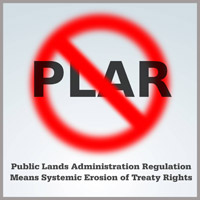
This latest legal challenge follows widespread controversy when Bill C-38 was rammed through Parliament in spring 2012. It re-wrote the federal environmental assessment law, weakened protection for fish and species at risk and gave the public less say in major industrial projects like new tar sands pipelines. Then Bill C-45 landed in winter 2012. It includes new legislation regarding the leasing of reserve lands, First Nations education, on-reserve voting rights, the abolishment of the Navigable Waters Protection Act, and other measure to further weaken environmental protection. "(Canadians) should be with us in support and send a message to Stephen Harper and his government that what they're doing is wrong. They can't ram bills down our throats and expect us to roll over and accept it because this is going to affect our future, affect the future of Canada," said Mikisew Chief Steve Courtoreille. "We believe that all Canadians care, just as we do, about protecting our environment and respecting First Nations treaty rights... At the end of the day, we will not sacrifice our treaty rights and the environment for the almighty dollar. There has to be balance," said Chief Clifford Stanley of Frog Lake First Nation. Robert Janes, counsel for the two First Nations, says the government should have consulted with First Nations as soon as work began on the legislation. Janes expects that First Nations across the country will apply for intervener status. View January 14, 2013 Alberta Sweet Grass, Vol. 20, Issue 2 coverageView January 11, 2013 Environmental Defence coverage View January 8, 2013 Globe and Mail coverage View January 7, 2013 Edmonton Journal coverage View Federal Court Index and Docket for Chief Steve Courtoreille Et All v. The Governor General In Council Et All View January 3, 2013 Olthuis Kleer Towshend LLP blog post View December 20, 2012 Olthuis Kleer Towshend LLP report View December 14, 2012 Mikisew Cree First Nation press release View Mikisew Cree First Nation website View Frog Lake First Nation website Sources:
Alberta Sweet Grass, Environmental Defence, Mikisew
|
|
 Print version Print version |
Top |
| Bipole III Coalition Files Motion | 18 January 13 |

Hearings were adjourned November 22, 2012, to allow time to review Manitoba Hydro's January 2013 supplemental environmental statement for three route changes arising from reviews and proceedings. After hearings adjourned late November, the CEC sent a December 3, 2012 letter to Manitoba Hydro with new information requests relating to the feasibility of connecting Bipole III to the existing Dorsey Converter Station and/or connecting Bipole I or II to the Riel Converter Station presently under construction. The Bipole III Coalition, a grass-roots organization of Manitoba citizens concerned about the routing of Bipole III, filed a notice of motion with the CEC on January 11, 2013. The Bipole III Coalition notice of motion requests that:
The CEC had not responded to the Bipole III Coalition's January 11, 2013 Notice of Motion, or scheduled a date for the forthcoming motions hearing as of January 17, 2013. View January 11, 2013 Bipole III Coalition Notice of MotionView January 11, 2013 Bipole III Coalition Motion Arguments View Bipole III Coalition website View Manitoba Wildlands Bipole III Clean Environment Commission Chart: Events, Decisions, Documents (Updated January 17, 2013) View Manitoba Wildlands Manitoba Hydro Projects: Bipole III CEC Hearings webpage Source:
Bipole III Coalition
|
|
 Print version Print version |
Top |
| EPA Bows to Oil Company Pressure | 18 January 13 |
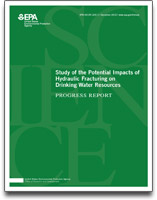
EPA asked an independent scientist named Geoffrey Thyne to analyze water samples taken from 32 water wells near Range's Parker County wells. In the report obtained by the Associated Press, Thyne concluded through chemical isotope testing, that the gas in the drinking water of Fort Worth, could have originated from Range wells. EPA was seeking industry leaders to participate in a national study into hydraulic fracturing. Range Resources told EPA officials in Washington that so long as the agency continued to pursue a "scientifically baseless" action against the company, it would not take part in the study and would not allow government scientists onto its drilling sites, according to company attorney David Poole. View December 2012 Environmental Protection Agency reportView January 18, 2013 Vice article View January 17, 2013 Counterpunch article View January 16, 2013 Associated Press article View January 11, 2013 Reuters article Listen to Yoko Ono - Imagine NY Without Fracking View January 18, 2013 Huffington Post article |
|
 Print version Print version |
Top |
| Premier and Governors Urge Obama to Approve Keystone XL Pipeline | 18 January 13 |
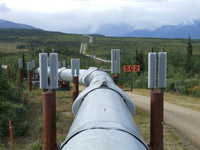
Source: Inhabitat
"As Canada's largest energy union, CEP has always believed strongly that the climate crisis must be addressed in the most pressing terms," said Dave Coles, president of the Communications, Energy and Paperworkers Union of Canada. "t is why we oppose export pipelines such as Keystone XL that sell off our oil resources and kill jobs in the process." CEP believes it is necessary to transition away from fossil energies by reducing emissions and investing in green energies while ensuring a just transition for energy workers and their communities. The Pembina Institute also argues that emissions will go up as direct result of the TransCanada Keystone Pipeline. Its new report disputes the U.S. State Department's original conclusion that if the Keystone weren't built, the oilsands would ramp up anyway. "The last EIS (Environmental Impact Statement) said there would be no increase in climate emissions, because other transportation options will simply move ahead. That's not true. The Keystone XL is the biggest and most imminent pipeline on the table," said Nathan Lemphers from the Pembina Institute. View January 18, 2013 Communications, Energy and Paperworkers Union of Canada articleView January 17, 2013 CBC News article View January 17, 2013 Common Dreams article View January 17, 2013 Pembina Institute article View January 16, 2013 ForestTalk.com article |
|
 Print version Print version |
Top |


 RSS Feeds:
RSS Feeds: